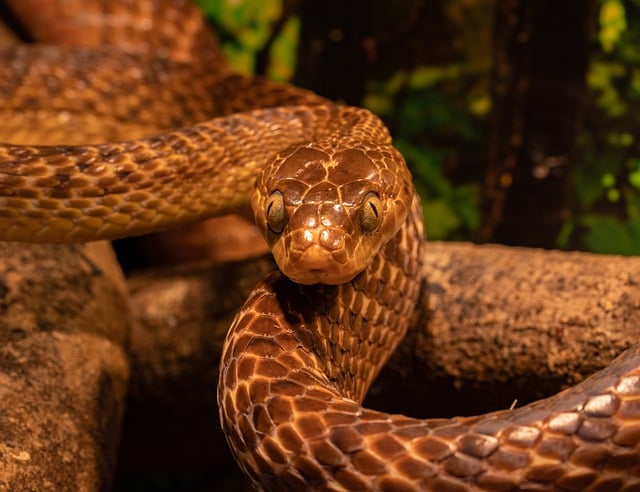Christians have varying beliefs and interpretations when it comes to owning snakes. Some Christians may view owning snakes as a harmless hobby or pet ownership, while others may have concerns about the symbolism or potential dangers associated with snakes. Ultimately, whether or not a Christian can own a snake may depend on their personal beliefs and convictions.
Table of Contents
Religious Perspectives on Snake Ownership
Have you ever wondered if Christians can own snakes? It’s a question that may not have a straightforward answer, as beliefs and interpretations can vary among different Christian denominations. Let’s explore some of the religious perspectives on snake ownership within the Christian faith.
In the Bible, snakes are often associated with evil and temptation. The serpent in the Garden of Eden is a well-known example of this, as it tempted Eve to eat the forbidden fruit. This negative portrayal of snakes has led some Christians to view them as symbols of sin and deception, and therefore, they may choose to avoid owning them.
On the other hand, some Christians believe that owning snakes is not inherently sinful. They argue that God created all creatures, including snakes, and that it is possible to appreciate and care for them in a responsible and ethical manner. In fact, some Christians may even see owning snakes as a way to connect with nature and appreciate God’s diverse creation.
One important consideration for Christians who are thinking about owning snakes is the issue of animal welfare. The Bible teaches that humans have a responsibility to care for and steward God’s creation. This means that Christians should ensure that their snakes are provided with proper food, shelter, and medical care. Neglecting the needs of a pet snake would go against the principles of compassion and stewardship that are central to the Christian faith.
Another factor to consider is the potential impact of snake ownership on others. Some people may have a fear of snakes, while others may view them as dangerous or unclean. Christians who choose to own snakes should be mindful of how their actions may affect those around them and should strive to be respectful and considerate of others’ feelings and beliefs.
Ultimately, the decision to own a snake as a Christian is a personal one that should be made prayerfully and thoughtfully. It is important to consider how snake ownership aligns with your own beliefs and values, as well as how it may impact your relationship with God and others.
In conclusion, the question of whether Christians can own snakes is not a simple one. While some Christians may choose to avoid owning snakes due to negative associations with these creatures in the Bible, others may see snake ownership as a way to appreciate and care for God’s creation. Regardless of where you fall on this issue, it is important to approach it with an open mind and a spirit of compassion and respect for all living beings.
Biblical Interpretations of Owning Snakes
Have you ever wondered if Christians can own snakes? It’s a question that has sparked debate among believers for years. Some argue that owning snakes goes against biblical teachings, while others believe that it is perfectly acceptable. Let’s take a closer look at what the Bible has to say about owning snakes.
One of the most commonly cited passages in the Bible when it comes to owning snakes is found in the book of Genesis. In Genesis 3:1, we read about the serpent who tempted Eve in the Garden of Eden. Many Christians believe that this passage serves as a warning against owning snakes, as they are often associated with deception and evil.
However, it’s important to remember that the serpent in the Garden of Eden was not a literal snake, but rather a symbol of Satan. In fact, snakes are mentioned in other parts of the Bible without any negative connotations. For example, in the book of Numbers, Moses is instructed by God to make a bronze snake and put it on a pole to heal the Israelites who had been bitten by venomous snakes.
Some Christians argue that owning snakes can actually be a way to appreciate God’s creation. Snakes are fascinating creatures with unique characteristics and behaviors. By caring for a snake, one can gain a greater understanding and appreciation for the diversity of God’s creation.
Others point to the story of St. Patrick, who is said to have driven all the snakes out of Ireland. While this story is likely more myth than fact, it does show that snakes have long been associated with evil in Christian tradition.
Ultimately, whether or not Christians can own snakes comes down to personal interpretation of the Bible. Some may feel convicted against owning snakes based on certain passages, while others may see no issue with it. As with many things in the Christian faith, it is important to prayerfully consider your own beliefs and convictions.
In conclusion, the question of whether Christians can own snakes is a complex one with no easy answer. While some may see owning snakes as going against biblical teachings, others may view it as a way to appreciate God’s creation. Ultimately, it is up to each individual believer to prayerfully consider their own beliefs and convictions on the matter.
Ethical Considerations for Christian Snake Owners

So, you’re a Christian who loves snakes and is considering owning one as a pet. But you may be wondering, is it ethical for Christians to own snakes? Let’s delve into this topic and explore some considerations for Christian snake owners.
First and foremost, it’s important to remember that as Christians, we are called to be good stewards of God’s creation. This means taking care of the animals and the environment that God has entrusted to us. When considering owning a snake, it’s crucial to ensure that you can provide a safe and healthy environment for the animal. This includes proper housing, feeding, and veterinary care.
Another ethical consideration for Christian snake owners is the issue of respect for life. As Christians, we believe that all life is sacred and should be treated with reverence. This includes the lives of animals, such as snakes. When owning a snake, it’s essential to treat the animal with kindness and compassion, recognizing its inherent value as a living creature created by God.
Additionally, some Christians may have concerns about owning snakes due to biblical references to serpents. In the Bible, snakes are often associated with evil and deception, such as in the story of Adam and Eve in the Garden of Eden. However, it’s important to remember that these are symbolic representations and should not be taken as a literal condemnation of all snakes.
Furthermore, owning a snake can provide an opportunity for Christians to learn more about God’s creation and appreciate the diversity of life that He has created. Snakes are fascinating creatures with unique behaviors and adaptations, and caring for one can deepen your understanding and appreciation of the natural world.
When considering owning a snake as a Christian, it’s also important to be mindful of any potential conflicts with your faith community. Some Christians may have negative attitudes towards snakes due to cultural or religious beliefs. It’s essential to engage in open and respectful dialogue with fellow believers about your decision to own a snake, and to educate them about the responsible care and treatment of these animals.
In conclusion, while there may be ethical considerations for Christians who are considering owning snakes, it is possible to do so in a way that is consistent with our faith. By being good stewards of God’s creation, treating snakes with respect and compassion, and engaging in open dialogue with our faith community, Christians can responsibly enjoy the companionship of these fascinating creatures. So, if you’re a Christian who loves snakes, don’t be afraid to explore the possibility of owning one – just remember to do so with care, compassion, and reverence for God’s creation.
The History of Snake Handling in Christian Traditions
Snake handling in Christian traditions is a practice that has sparked controversy and debate for many years. While some Christians believe that handling snakes is a way to demonstrate their faith and trust in God, others argue that it is a dangerous and unnecessary practice. So, can Christians own snakes?
To understand the history of snake handling in Christian traditions, we must first look back to the early 20th century in the United States. The practice of snake handling gained popularity in some Pentecostal churches, particularly in the Appalachian region. Followers of this practice believed that handling snakes was a way to test their faith and show their devotion to God.
One of the key passages in the Bible that is often cited by snake handlers is Mark 16:18, which states, “They will pick up snakes with their hands; and when they drink deadly poison, it will not hurt them at all.” This verse is interpreted by some as a commandment to handle snakes as a demonstration of faith.
However, not all Christians interpret this passage in the same way. Many argue that it is not necessary to handle snakes in order to prove one’s faith in God. They believe that faith should be demonstrated through prayer, worship, and living a righteous life, rather than putting oneself in harm’s way by handling dangerous animals.
Despite the controversy surrounding snake handling, the practice continues to be a part of some Christian traditions today. There are still churches and religious groups that incorporate snake handling into their worship services, believing that it is a powerful way to connect with God and demonstrate their faith.
In recent years, there have been several high-profile incidents involving snake handling that have brought the practice into the spotlight. Tragically, some individuals have been injured or even killed while handling snakes during religious services. These incidents have raised questions about the safety and legality of snake handling in Christian traditions.
In response to these incidents, some states have passed laws banning the practice of snake handling in religious services. These laws are intended to protect individuals from harm and prevent further tragedies from occurring. However, some snake handlers continue to defy these laws and practice their faith in this way, despite the risks involved.
Ultimately, the question of whether Christians can own snakes is a complex and controversial issue. While some Christians believe that handling snakes is a legitimate expression of faith, others argue that it is dangerous and unnecessary. As with many religious practices, the interpretation of scripture and the application of faith are deeply personal and can vary widely among individuals and religious groups.
In conclusion, the history of snake handling in Christian traditions is a fascinating and contentious topic that continues to spark debate and discussion. While some Christians believe that handling snakes is a way to demonstrate their faith and trust in God, others argue that it is a dangerous and unnecessary practice. As with any religious practice, it is important for individuals to carefully consider the implications and consequences of their beliefs and actions.
Personal Testimonies of Christian Snake Owners
As a Christian, I have always been fascinated by snakes. Their unique patterns and movements have always captivated me, and I have found joy in learning about these creatures. However, as a Christian, I have also encountered some skepticism and even judgment from fellow believers about my interest in snakes. Many people believe that Christians should not own snakes, citing biblical passages that mention snakes in a negative light.
Despite these doubts, I have found comfort in knowing that there are other Christians who share my love for snakes. I have connected with a community of Christian snake owners who have shared their personal testimonies with me. These stories have helped me understand that owning a snake does not conflict with my faith, but rather enhances my appreciation for God’s creation.
One Christian snake owner shared with me how caring for her snake has taught her valuable lessons about responsibility and compassion. She explained that snakes, like any other pet, require love and care to thrive. By taking on the responsibility of caring for a snake, she has learned the importance of being a good steward of God’s creation.
Another Christian snake owner shared with me how owning a snake has deepened her faith. She explained that snakes are often misunderstood creatures, much like how some people misunderstand Christianity. By caring for her snake and learning about its behavior, she has gained a greater appreciation for the diversity of God’s creation.
These personal testimonies have reassured me that owning a snake as a Christian is not only acceptable but can also be a meaningful experience. As I continue to care for my own snake, I am reminded of the beauty and complexity of God’s creation. I am grateful for the opportunity to learn more about these fascinating creatures and to share my passion with others who understand and support me.
In conclusion, Christians can own snakes without compromising their faith. Personal testimonies from fellow believers have shown me that owning a snake can be a rewarding and enriching experience. By caring for these creatures, we can learn valuable lessons about responsibility, compassion, and the diversity of God’s creation. I am grateful for the support and understanding of my fellow Christian snake owners, and I look forward to continuing to care for my snake with love and respect.
Conclusion
Christians can own snakes as pets, but they should do so responsibly and in accordance with local laws and regulations. It is important for Christians to consider the well-being of the animal and to ensure that they are able to provide proper care for their snake. Ultimately, the decision to own a snake as a Christian should be made prayerfully and with consideration for the ethical implications of keeping a wild animal as a pet.
For licensing reasons, we must provide the following notice: This content was created in part with the help of an AI.


